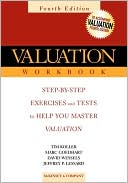List Books » Valuation Workbook: Step-by-Step Exercises and Tests to Help You Master Valuation (Wiley Finance Series)
Category Books
- Fiction Books & Literature
- Graphic Novels
- Horror
- Mystery & Crime
- Poetry
- Romance Books
- Science Fiction & Fantasy
- Thrillers
- Westerns
- Ages 0-2
- Ages 3-5
- Ages 6-8
- Ages 9-12
- Teens
- Children's Books
- African Americans
- Antiques & Collectibles
- Art, Architecture & Photography
- Bibles & Bible Studies
- Biography
- Business Books
- Christianity
- Computer Books & Technology Books
- Cookbooks, Food & Wine
- Crafts & Hobbies Books
- Education & Teaching
- Engineering
- Entertainment
- Foreign Languages
- Game Books
- Gay & Lesbian
- Health Books, Diet & Fitness Books
- History
- Home & Garden
- Humor Books
- Judaism & Judaica
- Law
- Medical Books
- New Age & Spirituality
- Nonfiction
- Parenting & Family
- Pets
- Philosophy
- Political Books & Current Events Books
- Psychology & Psychotherapy
- Reference
- Religion Books
- Science & Nature
- Self Improvement
- Sex & Relationships
- Social Sciences
- Sports & Adventure
- Study Guides & Test Prep
- Travel
- True Crime
- Weddings
- Women's Studies
Valuation Workbook: Step-by-Step Exercises and Tests to Help You Master Valuation (Wiley Finance Series) » (Workbook)

Authors: Tim Koller, McKinsey & Company, Inc., Marc Goedhart, David Wessels, Jeffrey P. Lessard
ISBN-13: 9780471702160, ISBN-10: 0471702161
Format: Paperback
Publisher: Wiley, John & Sons, Incorporated
Date Published: December 2005
Edition: Workbook
Author Biography: Tim Koller
McKINSEY & COMPANY is a management consulting firm that helps leading corporations and organizations make distinctive, lasting, and substantial improvements in their performance. Over the past seven decades, the firm's primary objective has remained constant: to serve as an organization's most trusted external advisor on critical issues facing senior management. With consultants deployed from over eighty offices in more than forty countries, McKinsey advises companies on strategic, operational, organizational, financial, and technological issues. The firm has extensive experience in all major industry sectors and primary functional areas, as well as in-depth expertise in high-priority areas for today's business leaders.
Tim Koller is a partner in McKinsey's New York office. Tim has served clients in North America and Europe on corporate strategy and issues concerning capital markets, M&A transactions, and value-based management. He leads the firm's research activities in valuation and capital markets issues. He received his MBA from the University of Chicago.
Marc Goedhart is an associate principal in McKinsey's Amsterdam office. Marc has served clients across Europe on portfolio restructuring, issues concerning capital markets, and M&A transactions. He received a PhD in finance from Erasmus University Rotterdam.
David Wessels is an Adjunct Professor of Finance and director of executive education at the Wharton School of the University of Pennsylvania. Named by BusinessWeek as one of America's top business school instructors, he teaches corporate valuation at the MBA and Executive MBA levels. David received his PhD from the University of California at Los Angeles.
Jeffrey P. Lessard, CFA, is Associate Professor of Finance and Accounting at the Rochester Institute of Technology. Dr. Lessard received his PhD in finance from the Sam M. Walton College of Business at the University of Arkansas. His primary scholarly interests are in the areas of corporate valuation, the influence of the board of directors on the creation of shareholder value, portfolio performance, and performance and presentation standards in the investment industry.
Book Synopsis
The Ideal Companion to VALUATION FOURTH EDITION
If you want to get more out of Valuation, Fourth Edition, then pick up the Valuation Workbook. This comprehensive study guide provides you with an invaluable opportunity to explore your understanding of the strategies and techniques covered in the main text, before putting it to work in real-world situations.
This hands-on Workbook:
- Walks you through Valuation, Fourth Edition—providing chapter-by-chapter coverage of the core text
- Tests your comprehension of the ideas presented throughout, with multiple-choice questions and problems
- Offers complete coverage of forecasting short, medium, and continuing value; calculating and interpreting results; real option pricing methods; and much more
Valuation Workbook is filled with a wealth of practical learning exercises and information that will help you understand and apply the proven principles found in Valuation, Fourth Edition.
Table of Contents
Introduction.
Part One: Questions.
1 Why Maximize Value?
2 The Value Manager.
3 Fundamental Principles of Value Creation.
4 Do Fundamentals Really Drive the Stock Market?
5 Frameworks for Valuation.
6 Thinking about Return on Invested Capital and Growth.
7 Analyzing Historical Performance.
8 Forecasting Performance.
9 Estimating Continuing Value.
10 Estimating the Cost of Capital.
11 Calculating and Interpreting Results.
12 Using Multiples for Valuation.
13 Performance Measurement.
14 Performance Management.
15 Creating Value through Mergers and Acquisitions.
16 Creating Value through Divestitures.
17 Capital Structure.
18 Investor Communications.
19 Valuing Multibusiness Companies.
20 Valuing Flexibility.
21 Cross-Border Valuation.
22 Valuation in Emerging Markets.
23 Valuing High-Growth Companies.
24 Valuing Cyclical Companies.
25 Valuing Financial Institutions.
Part Two: Answers.
1 Why Maximize Value?
2 The Value Manager.
3 Fundamental Principles of Value Creation.
4 Do Fundamentals Really Drive the Stock Market?
5 Frameworks for Valuation.
6 Thinking about Return on Invested Capital and Growth.
7 Analyzing Historical Performance.
8 Forecasting Performance.
9 Estimating Continuing Value.
10 Estimating the Cost of Capital.
11 Calculating and Interpreting Results.
12 Using Multiples for Valuation.
13 Performance Measurement.
14 Performance Management.
15 Creating Value through Mergers and Acquisitions.
16 Creating Value through Divestitures.
17 Capital Structure.
18 Investor Communications.
19 Valuing Multibusiness Companies.
20 Valuing Flexibility.
21 Cross-Border Valuation.
22 Valuation in Emerging Markets.
23 Valuing High-Growth Companies.
24 Valuing Cyclical Companies.
25 Valuing Financial Institutions.
Subjects
 Professional Finance & Investing
Professional Finance & Investing  Corporate Finance
Corporate FinanceBusiness Books
 Professional Finance & Investing
Professional Finance & Investing  Insurance
Insurance
